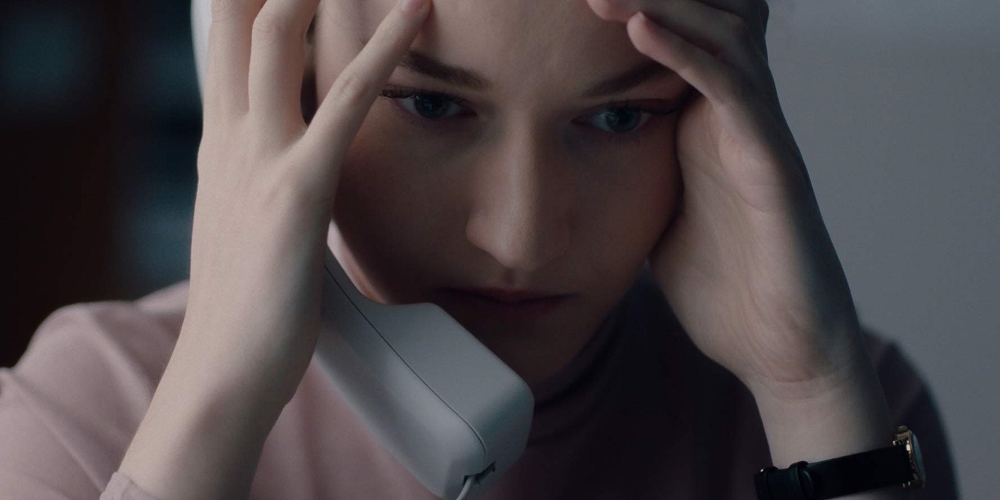
It’s still dark outside when she leaves for work, and it will be long after dark when she finally heads for home. As she slouches sleepily in the back seat of the car that has come to fetch her, the city lights shimmer and gleam from afar; an intimation of her dreams, and the distance she must travel to reach them. Taut, sensitive, and almost poetic in its meticulous observation, The Assistant, Australian director Kitty Green’s feature debut, depicts a day in the life of Jane, a recent college graduate working as an assistant to a high-ranking movie studio executive. Researched and created following the disclosures of sexual assault and harassment in the film industry igniting the explosion of the #MeToo movement in 2017, while obvious inferences may be made to the Weinstein scandal, the film goes far beyond the depiction of an individual predator and his modus operandi to expose patterns of systemic sexism and abuse in workplace culture. The #MeToo movement has raised as many questions as it has awareness, among them: “how is it possible that people did not know?” and “why didn’t anyone speak out?” Although its narrative arc is fictional, The Assistant illuminates these and other questions, providing a thoughtful opening for further conversations and action.
Green reverses expectations by deliberately focusing on Jane, an entry-level worker whose role is to remain in the background, making sure that everything goes smoothly. Her predatory boss is significantly absent from the film, appearing only as a passing presence, or a disembodied voice on the phone. This choice shifts the emphasis of the film – this is not an exposé of an individual villain, but rather of the system that enables such villains to exist and act. Brilliantly portrayed in a nuanced, expressive performance by Julia Garner (Ozark, We Are Who We Are), Jane represents those invisible people who are expected to work long hours for low pay, because the job is a great opportunity in a competitive field. Her dream is to become a film producer, and this is the first step, teetering precariously on the lowest rung of the ladder. Jane is the first to come into the office in the morning, well before the two male assistants. Her job description seems to have no boundaries as she makes coffee, goes over accounts, fetches sandwiches, makes travel arrangements, and even scrubs the boss’s couch. Yes, that couch. She’s expected to be a wizard of diplomacy, handling awkward and difficult phone conversations, dealing with last minute changes to schedules, filling in as an impromptu babysitter, and abjectly apologizing – in writing – if the boss is not pleased. The Assistant is set in the film industry, but it could be any office setting in any field.
The casual gender discrimination of the workplace is glaringly obvious as the two unnamed male assistants (Noah Robbins and Jon Orsini) come in later, tell Jane what to do, expect her to run errands for them, share jokes and exclude her from their male camaraderie. None of this is explicit, it’s somehow understood that they can be free to leave early enough to go out for drinks after work while Jane is obliged to remain until the boss says she can go. All this she accepts without question. The results of this workplace environment are plain to see when Jane goes to what must be the executive area: as she walks from desk to desk delivering scripts, the entire floor is overwhelmingly male, there is only one woman in sight. The message is clear: if you are a woman in this industry, the chances of promotion are low, very low.
Following several documentaries that focus primarily on women and media – Ukraine is Not a Brothel (2013), The Face of Ukraine: Casting Oksana Baiul (2015), Casting JonBenet (2017) – The Assistant benefits from Green’s experience. It’s understated yet precise observation allows the reader to enter into Jane’s experience, never seeing or hearing more than she sees or hears. As the evidence – an earring found on the rug in the boss’s office, a beautiful and very young new assistant whose job-related experience consists of waitressing – and tension mounts, Jane silently considers the implications of what she observes, her every thought and conflicting emotion reflected in her expression and her eyes.
What follows is fascinating and harrowing. As I prefer to avoid spoilers, I’ll just say that Matthew Macfadyen delivers an excellent performance. The Assistant is reminiscent of a horror film as its tense layers of oppression accrue, augmented by the delicate, haunting notes of opening music by Tamar-Kali, and the omni-present sounds of a working office: printers, phones, elevator, coffee-maker, drawers opening and closing. We are beginning to see what happens when women make movies: the world reflected back to us from the screen looks different. In its close focus on Jane, The Assistant makes a powerful and profound statement: she is seen, her voice is heard.
The Assistant is distributed in Israel by Red Cape Distributions and will be released beginning April 29, 2021 at the Tel Aviv Cinematheque and Movieland Theatres.
The Assistant
USA/2019/87 minutes/English with Hebrew subtitles
Written and directed by Kitty Green; Cinematography: Michael Latham; Editing: Kitty Green and Blair McClendon; Music: Tamar-kali; Cast: Julia Garner, Tony Torn, Matthew Macfadyen





